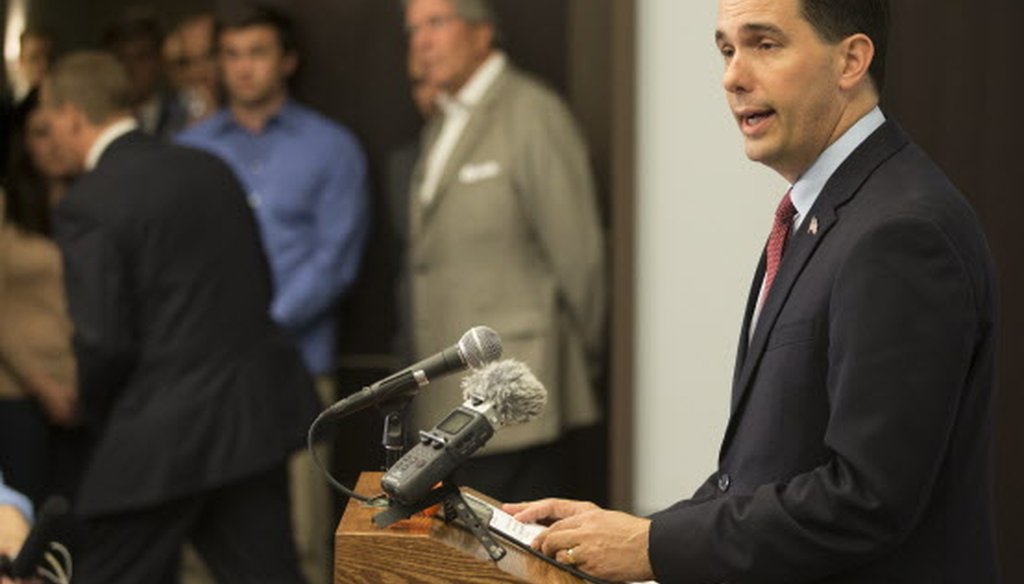



Gov. Scott Walker ended his 2016 presidential campaign on Sept. 21, 2015. (Mark Hoffman photo)
Gov. Scott Walker, once an early favorite among the 2016 Republican candidates for president, doubtless wishes he were canvassing the Granite State, soliciting votes ahead of the New Hampshire primaries.
Instead, the news lately about his bid, which ended in September 2015, is his campaign’s red ink.
On Jan. 29, 2016 it was reported that despite raising $500,000 in the last three months of 2015, Walker’s presidential campaign was still in debt -- by more than $1 million.
The governor announced the same day that his campaign would no longer pay for the travel costs of his state-provided security team when he leaves Wisconsin for political events. Instead, those future travel costs for the security team for political events would once again be the responsibility of state taxpayers.
Cueing off those two news items, a top state Assembly Democrat lambasted Walker the same day.
"Faced with $1 million in campaign debt, Governor Walker is trying to cut corners in any way he can," Assistant Minority Leader Katrina Shankland of Stevens Point said in a news release. "In this case, he is unloading his campaign security costs onto the backs of Wisconsin taxpayers."
Walker is putting travel expenses for his security team for future political trips back onto taxpayers -- as they long have been under him and previous governors -- but Shankland’s claim mixes apples and oranges.
Walker is not unloading such expenses from his presidential campaign, or any of his presidential campaign debt, onto taxpayers.
The security detail backdrop
Wisconsin taxpayers have long paid for security officers to give around-the-clock protection to their governors.
But the costs have made more news since shortly after Walker took office in January 2011. Almost immediately, Walker launched legislation that resulted in Act 10, a law that sharply curtails the collective bargaining powers of both state and local government employees. Thousands upon thousands of people demonstrated daily in Madison. Walker beefed up security. Costs mounted.
The Milwaukee Journal Sentinel reported, for example, that in 2013 taxpayers spent $2.23 million for the 10 state troopers who protect Walker and his family, GOP Lt. Gov. Rebecca Kleefisch, and dignitaries from other states and countries who visit Wisconsin. That was up from $657,457 paid out by Walker’s predecessor, Democrat Jim Doyle, during his last year in office in 2010. Walker’s security bill inched higher in 2014, to $2.3 million.
A large part of the increase came because Walker had added five members to what is officially known as the Dignitary Protection Unit in the wake of the Act 10 protests. Both Walker and Kleefisch were the target of death threats during the frenzied debate over the bill. (The security unit did not provide services for lieutenant governors until Kleefisch came into office in 2011.)
Another factor, though, was an increase in travel costs due to out-of-state trips made by Walker as he was increasingly seen as a possible 2016 presidential contender. Walker made political trips to Iowa, New Hampshire, South Carolina and other states.
Taxpayers have routinely covered security costs for governors, on official business in Wisconsin and on political trips out of state. But Doyle, as one example, didn't travel outside Wisconsin on political jaunts nearly as often as Walker did as he pursued his White House run.
The presidential campaign
In March 2015, Transportation Secretary Mark Gottlieb, who oversees the security team, told the Legislature’s budget committee that taxpayers would foot the bill for providing security for Walker as he traveled around the country for what was then his budding presidential campaign. "The governor is the governor 24/7," he said, noting that taxpayers paid for security for previous governors on their political travels.
In April 2015, Our American Revival, which was then Walker’s presidential campaign-in-waiting, announced it would pick up the security officers' travel costs when Walker attended political rallies, fundraisers and other events related to what eventually would become his official bid for the White House.
So, that was a change from past practice, when taxpayers would cover all security expenses for a governor, even for political travel.
By early January 2016, Walker’s campaign had reimbursed taxpayers about $260,000 to cover airfare, hotels and other expenses for his security team while Walker ran for president. The most recent payment covered costs from July, August and September 2015.
According to Walker’s Department of Administration, Walker’s campaign has reimbursed the state for the travel expenses in full.
Our rating
Shankland said: "Faced with $1 million in campaign debt," Scott Walker "is unloading his campaign security costs onto the backs of Wisconsin taxpayers."
For future political trips, Walker is returning to the practice of taxpayers paying for travel expenses for his state security team.
But Walker is not unloading any of his presidential campaign debt onto taxpayers, including travel expenses for the security team. His campaign has already reimbursed the state for those expenses.
For a statement that contains an element of truth but ignores critical facts that would give a different impression, our rating is Mostly False.
Milwaukee Journal Sentinel, "Scott Walker still owes $1 million for presidential campaign," Jan. 29, 2016
Email exchange, Assembly Assistant Minority Leader Katrina Shankland aide Annika Petty, Feb. 3, 2016
Email exchange, Gov. Scott Walker press secretary Laurel Patrick, Feb. 3, 2016
Email exchange, Wisconsin Department of Administration spokesman Laurel Patrick, Feb. 4, 2016
In a world of wild talk and fake news, help us stand up for the facts.
